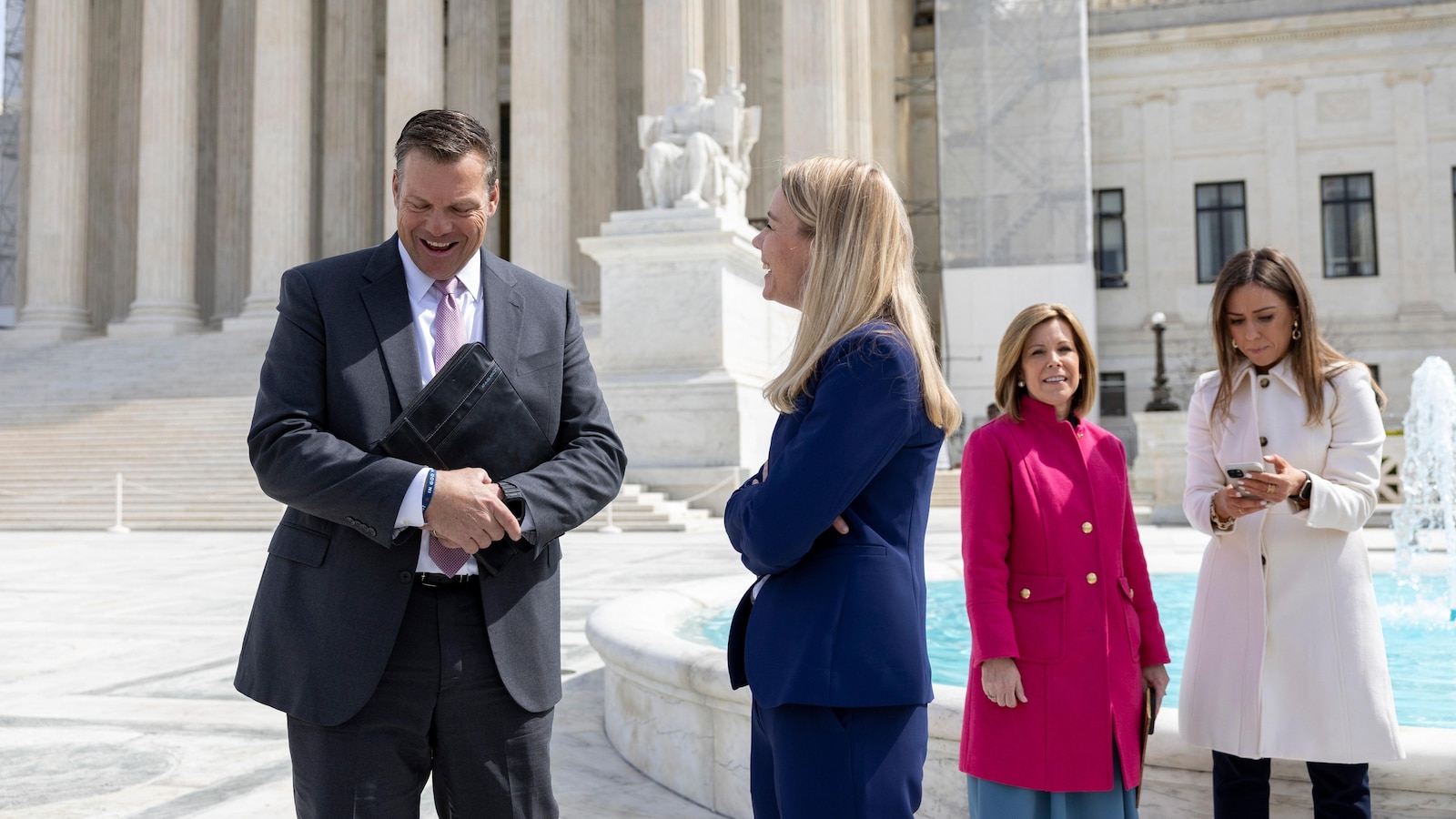
TOPEKA, Kan. — Kansas’ highest court on Friday struck down state laws regulating abortion providers more strictly than other health care professionals and a ban on a common second-trimester procedure, reaffirming its stance that the state constitution protects abortion access.
“We stand by our conclusion that section 1 of the Kansas Constitution Bill of Rights protects a fundamental right to personal autonomy, which includes a pregnant person’s right to terminate a pregnancy,” Justice Eric Rosen wrote for the majority in overturning the ban on a certain type of dilation and evacuation, also known as D&E.
In striking down the law on clinic regulations, the panel found that the state had failed to meet “its evidentiary burden to show the Challenged Laws further its interests in protection of maternal health and regulation of the medical profession as it relates to maternal health.”
The Kansas Supreme Court’s 5-1 rulings in two separate cases signal that the state’s Republican-controlled Legislature faces stricter limits on regulating abortion than GOP lawmakers thought and suggests other restrictions could fall. Lawsuits in lower state courts already are challenging restrictions on medication abortions, a ban on doctors using teleconferences to meet with patients, rules for what doctors must tell patients before an abortion and a requirement that patients wait 24 hours after receiving information about a procedure to terminate their pregnancies.
Justice K.J. Wall did not participate in either ruling on Friday while Justice Caleb Stegall was the lone dissenter.
In his dissenting opinion in the clinic regulations case, Stegall said the majority’s actions will damage the court’s legitimacy “for years to come.” He said that the declaration that the state constitution protects a right to bodily autonomy could affect a “massive swath” of health and safety regulations outside abortion, including licensing requirements for barbers.
“Surely the government does not have a compelling interest in who trims my beard?” Stegall wrote. “Let the lawsuits commence in this new target-rich environment. The majority has — perhaps unwittingly — put the entire administrative state on the chopping block of strict scrutiny.”
Stegall, who was appointed by conservative Republican Gov. Sam Brownback, is widely regarded as the court’s most conservative member.
Kansas’ top court declared in a 2019 decision that abortion access is a matter of bodily autonomy and a “fundamental” right under the state constitution. Voters in August 2022 also decisively rejected a proposed amendment that would have explicitly declared abortion not a fundamental right and allowed state lawmakers to greatly restrict or ban it.
Lawyers for the state had urged the justices to walk back the 2019 ruling and uphold the two laws, which hadn’t yet been enforced because of the legal battles over them. The state’s solicitor general, appointed by Republican Attorney General Kris Kobach, had argued the 2022 vote didn’t matter in determining whether the laws could stand.
The court disagreed and handed abortion-rights supporters a big legal victory.
Kansas has become an outlier among states with Republican-controlled Legislatures since the U.S. Supreme Court issued its Dobbs decision in June 2022, allowing states to ban abortion completely. That’s led to an influx of patients from states with more restrictive laws, particularly Oklahoma and Texas. The Guttmacher Institute, which supports abortion rights, projected last month that about 20,000 abortions were performed in Kansas in 2023 or 152% more than in 2020.
Kansas doesn’t ban most abortions until the 22nd week of pregnancy, but it requires minors obtain the written consent of their parents or a guardian. Other requirements, including the 24-hour waiting period and what a provider must tell patients, have been put on hold. A lower court is considering a challenge to them by providers.
Abortion opponents argued ahead of the August 2022 vote that failing to change the state constitution would doom long-standing restrictions enacted under past GOP governors. Kansas saw a flurry of new restrictions under former Republican Gov. Sam Brownback from 2011 through 2018.
The health and safety rules aimed specifically at abortion providers were enacted in 2011. Supporters said they would protect women’s health — though there was no evidence provided then documenting that such rules in other states led to better health outcomes. Providers said the real goal was to force them out of business.
The ban on a certain type of D&E procedure performed during the second trimester was the first of its kind when it was enacted in 2015.
According to state health department statistics, about 600 D&E procedures were done in Kansas in 2022, accounting for 5% of the state’s total abortions. About 88% of the state’s abortions occurred in the first trimester. The state has yet to release statistics for 2023.
The procedure ban would have forced providers to use alternative methods that the Center for Reproductive Rights, an abortion-rights advocacy group, has said are riskier for the patient and more expensive.
The 2019 ruling came in the early stages of the lawsuit over the 2015 ban. The justices kept the law on hold but sent the case back to the trial court to examine the ban further. A trial judge said the law could not stand.
Three of the court’s seven justices joined the court since the 2019 decision. All three were appointed by Democratic Gov. Laura Kelly, a strong abortion-rights supporter, but one of the three — Wall — removed himself from the cases.
In a landmark decision, the Kansas Supreme Court has ruled in favor of abortion access, striking down two anti-abortion laws that were passed by the state legislature. The court’s ruling is a major victory for reproductive rights advocates and a blow to anti-abortion activists who have been pushing for stricter regulations on abortion in the state.
The first law that was struck down by the court was a ban on a common second-trimester abortion procedure known as dilation and evacuation. The law, which was passed in 2015, criminalized the procedure and imposed fines and prison sentences on doctors who performed it. The court ruled that the ban was unconstitutional because it placed an undue burden on women seeking abortions and interfered with their right to make decisions about their own bodies.
The second law that was struck down by the court was a requirement that doctors inform patients seeking abortions that the procedure could be reversed after taking the first pill in a medication abortion. The court ruled that this requirement was not based on scientific evidence and was therefore misleading to patients. The court also found that the law violated doctors’ First Amendment rights by forcing them to provide false information to their patients.
The Kansas Supreme Court’s ruling is a significant victory for abortion rights in the state, where access to abortion has been increasingly restricted in recent years. The decision is expected to have far-reaching implications for other states that have passed similar anti-abortion laws, as it sets a precedent for courts to strike down laws that infringe on women’s reproductive rights.
Reproductive rights advocates have hailed the court’s decision as a major step forward in the fight for abortion access. They argue that laws restricting access to abortion do not make women safer or healthier, but instead force them to seek unsafe and illegal abortions. They also point out that access to abortion is a fundamental right that should not be subject to political interference.
Anti-abortion activists, on the other hand, have criticized the court’s ruling as an attack on unborn children and a violation of their religious beliefs. They argue that abortion is morally wrong and should be restricted in order to protect the rights of the unborn.
Overall, the Kansas Supreme Court’s ruling in favor of abortion access is a significant victory for reproductive rights advocates and a blow to anti-abortion activists. The decision reaffirms the importance of protecting women’s right to make decisions about their own bodies and sets a precedent for other states to follow suit in striking down restrictive anti-abortion laws.


